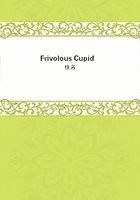
第16章
"Why, you look," said I, "as if you'd invented the finest scene ever written."She did not answer me directly, but stood looking up at the stars. Then she said, in a dreamy tone:
"I think I shall stick to my old idea in the book."As she spoke, Chillington came out. Even in the dim light I saw a frown on his face.
"I say, Wynne," said he, "where's Miss Myles?""She's gone to bed," I answered. "She told me to wish you good night for her, Miss Liston. No message for you, Chillington."Miss Liston's eyes were on him. He took no notice of her; he stood frowning for an instant, then, with some muttered ejaculation, he strode back into the house. We heard his heavy tread across the drawing room; we heard the door slammed behind him, and I found myself looking on Miss Liston's altered face.
"What does he want her for, I wonder!" she said, in an agitation that made my presence, my thoughts, my suspicions, nothing to her. "He said nothing to me about wanting to speak to her to-night." And she walked slowly into the house, her eyes on the ground, and all the light gone from her face, and the joy dead in it. Whereupon I, left alone, began to rail at the gods that a dear, silly little soul like Miss Liston should bother her poor, silly little head about a hulking fool; in which reflections Idid, of course, immense injustice not only to an eminent author, but also to a perfectly honorable, though somewhat dense and decidedly conceited, gentleman.
The next morning Sir Gilbert Chillington ate dirt--there is no other way of expressing it--in great quantities and with infinite humility.
My admirable friend Miss Pamela was severe. I saw him walk six yards behind her for the length of the terrace: not a look nor a turn of her head gave him leave to join her. Miss Liston had gone upstairs, and I watched the scene from the window of the smoking room. At last, at the end of the long walk, just where the laurel-bushes mark the beginning of the shrubberies--on the threshold of the scene of his crime--Pamela turned round suddenly and faced the repentant sinner. The most interesting things in life are those which, perhaps by the inevitable nature of the case, one does not hear; and I did not hear the scene which followed. For a while they stood talking--rather, he talked and she listened. Then she turned again and walked slowly into the shrubbery. Chillington followed. It was the end of a chapter, and I laid down the book.
How and from whom Miss Liston heard the news which Chillington himself told me, without a glimmer of shame or a touch of embarrassment, some two hours later, I do not know; but hear it she did before luncheon; for she came down, ready armed with the neatest little speeches for both the happy lovers.
I did not expect Pamela to show an ounce more feeling than the strictest canons of propriety demanded, and she fulfilled my expectations to the letter; but I had hoped, I confess, that Chillington would have displayed some little consciousness. He did not; and it is my belief that, throughout the events which Ihave recorded, he retained, and that he still retains, the conviction that Miss Liston's interest in him was purely literary and artistic, and that she devoted herself to his society simply because he offered an interesting problem and an inspiring theme.
An ingenious charity may find in that attitude evidence of modesty; to my thinking, it argues a more subtle and magnificent conceit than if he had fathomed the truth, as many humbler men in his place would have done.
On the day after the engagement was accomplished Miss Liston left us to return to London. She came out in her hat and jacket and sat down by me; the carriage was to be round in ten minutes.
She put on her gloves slowly and buttoned them carefully. This done, she said:
"By the way, Mr. Wynne, I've adopted your suggestion. The man doesn't find out.""Then you've made him a fool?" I asked bluntly.
"No," she answered. "I--I think it might happen though he wasn't a fool."She sat with her hands in her lap for a moment or two, then she went on, in a lower voice:
"I'm going to make him find out afterward."
I felt her glance on me, but I looked straight in front of me.
"What, after he's married the shallow girl?"
"Yes," said Miss Liston.
"Rather too late, isn't it? At least, if you mean there is to be a happy ending."Miss Liston enlaced her fingers.
"I haven't decided about the ending yet," said she.
"If you're intent to be tragical--which is the fashion--you'll do as you stand," said I.
"Yes," she answered slowly, "if I'm tragical, I shall do as Istand."
There was another pause, and rather a long one; the wheels of the carriage were audible on the gravel of the front drive. Miss Liston stood up. I rose and held out my hand.
"Of course," said Miss Liston, still intent on her novel, "Icould----" She stopped again, and looked apprehensively at me.
My face, I believe, expressed nothing more than polite attention and friendly interest.
"Of course," she began again, "the shallow girl--his wife--might--might die, Mr. Wynne."
"In novels," said I with a smile, "while there's death, there's hope.""Yes, in novels," she answered, giving me her hand.
The poor little woman was very unhappy. Unwisely, I dare say, Ipressed her hand. It was enough, the tears leaped to her eyes; she gave my great fist a hurried squeeze--I have seldom been more touched by any thanks, how ever warm or eloquent--and hurried away.